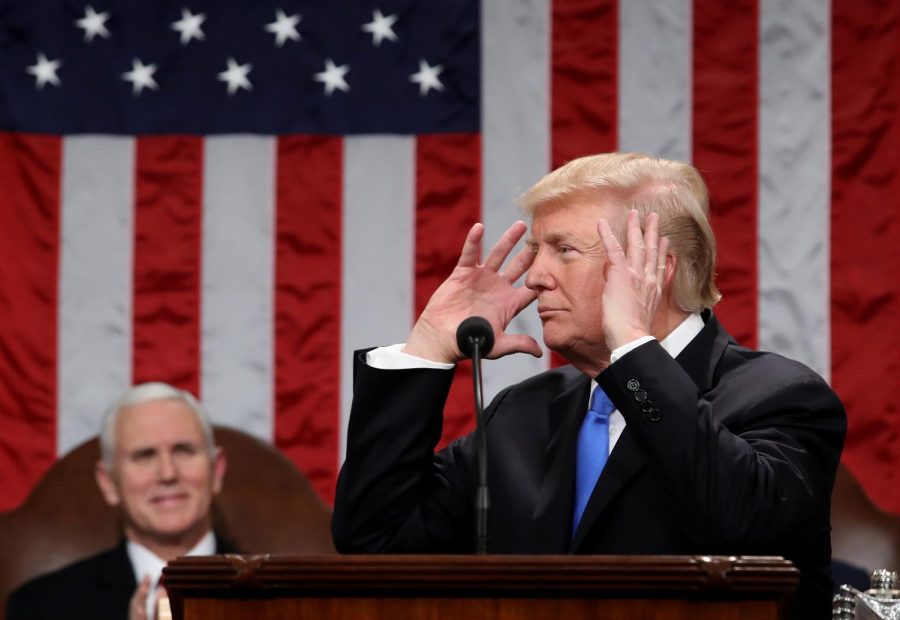Editorial: Reflections on the State of the Union Address
Donald Trump’s first ever State of the Union was either excellent or terrible, depending on who you ask. I suppose that’s a reflection on the divided nature of this country, something that Trump asked to bridge, despite worse partisanship than ever before. Indeed, as Democrats sat stony-faced and dour, Times Up pins glistening on their chests, it somehow seemed less likely than ever that national unity was possible.
It seemed that unity wasn’t what Trump was going for; in fact, I think his speech did exactly what it intended to do- reinforce his base while possibly enticing moderates. Trump painted a message of economic resurgence despite external forces trying to bring America down, and this amalgamation of nationalism and optimism served its purpose perfectly.
Everything was surprisingly coherent, with far fewer superlatives than usual, but that’s no doubt due to the use of a teleprompter. Still, it was nice to see Trump relaxed and reasonable. The speech was reminiscent of his early 2017 address to Congress, which was not officially a State of the Union.
As many presidents, notably Obama, had done before him, Trump provided real-life examples to support his worldview. There were three instances that particularly stood out to me, and they offer interesting tidbits about the Trump presidency itself when looked at as a whole.
First was his recounting of the story of Kayla Cuevas and Nisa Mickens, who were gunned down by a Mexican-American gang known as MS-13. This continued Trump’s xenophobia towards Mexico and affirmed his opposition to illegal immigration, which no doubt was very popular with his base and resonated with some of the more impressionable Americans out there (this was all laden with jarring imagery in the form of words like “brutal”, “savage”, and “tragic”, which really set an ominous mood).
Later, Trump went on to commend the Holets family for taking in the child of a heroin addict. This showed the resilience of the American spirit, but was sort of ironic because Trump has been criticized for not doing enough to combat the opioid crisis. This was an exceptionally moving portion of the speech, and drew thunderous applause from (the republican side of) Congress.
Even further in the speech, Trump lauded a tear-stricken North Korean defector, who at one point stood up and raised his crutches over his head to a standing ovation. Throughout the entire speech, Trump had criticized North Korea as Americas’s greatest enemy, calling its regime “depraved” and “reckless”.
Whether you like the president or not, you have to admit that this speech had some fine rhetoric, and viscerally moved even leftists like myself. There were undoubtedly some powerful moments there, and what drew all those moments together was the idea of the American Dream despite hardships and threats, optimism despite the forces of evil. Through all of that, Trump effectively painted himself and his administration in the thick of it, instilling pride and credibility in him. So, a good speech, all in all, even if it was much to the chagrin of the Democrats.
Oh, the Democrats. Several boycotted the speech, and those that stayed stared Trump down, poker-faced, clearly under orders not to clap. It was pretty surreal watching the Black Caucus sitting there and not moving when Trump noted that African-American employment was at an all-time high. Of course, it probably has little to do with Trump (and more to do with Obama, some would say), but that really highlighted the political divide we’re in. As previously mentioned, the Time’s Up pins against sexual harassment sent a message of solidarity with women and resistance to the president from the Democrats, and their presence was definitely a bit of an elephant in the room.
What’s a Trump event without some controversy? After the State of the Union Address, our president tweeted that viewership was “the highest in history”, which was quickly fact-checked as false- both Clinton and Obama had more viewers for their past addresses.


